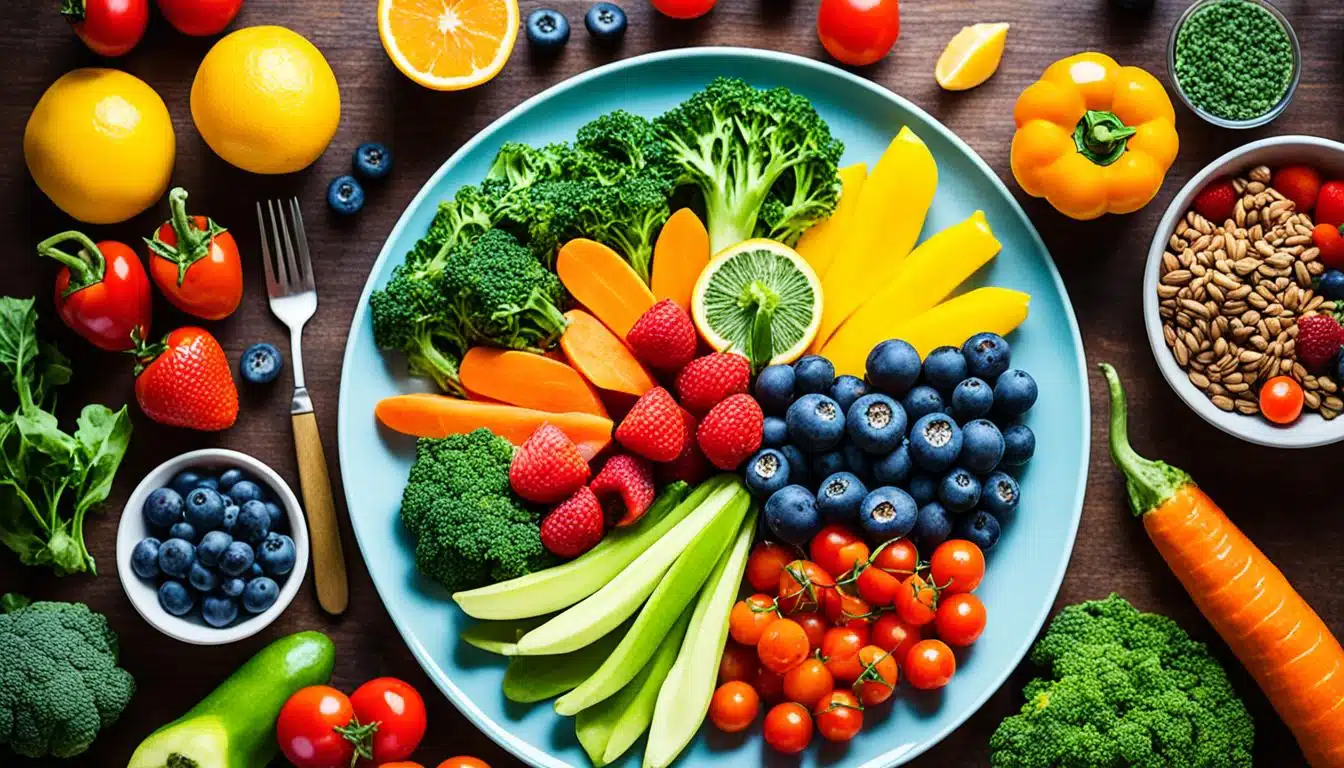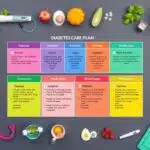Starting a new diet can feel like a lot, especially with so many options. The vegan diet is becoming popular for its health benefits and kindness to animals. It’s all about eating plant-based foods and avoiding animal products. This way of eating can make you feel great and help the planet, too.
Key Takeaways
- The vegan diet is a plant-based approach that excludes all animal products, including meat, dairy, and eggs.
- A well-planned vegan diet can provide a wide range of essential nutrients and offer numerous health benefits.
- Adopting a vegan lifestyle extends beyond just food, encompassing ethical and environmental considerations.
- Transitioning to a vegan diet requires mindful meal planning and preparation to ensure a balanced, nutrient-dense intake.
- Vegan diets can be tailored to meet the specific needs of athletes, pregnant individuals, and other populations.
Understanding the Vegan Diet
A vegan diet is more than just what you eat. It’s a lifestyle focused on health, ethics, and the planet. Vegans don’t eat any animal-based products. This means no meat, dairy, or eggs. Instead, they fill their plates with plant-based foods like fruits, vegetables, and grains.
What Defines a Vegan Diet?
Being vegan is more than avoiding meat and dairy. It’s a full commitment to eating only plant-based foods. This includes staying away from eggs and honey. It’s a lasting choice that shows love for animals and the environment.
A Lifestyle Choice Beyond Food
Veganism isn’t just about food. It’s a way of living that avoids all animal products. This means saying no to leather and fur, as well as some cosmetics. Choosing this path means caring about living cruelty-free and sustainably.
Ethical and Environmental Considerations
Being vegan is deeply ethical and green. Vegans do their best to avoid harming animals and the planet. They eat plant-based to lower their impact and support a sustainable food system.
Health Benefits of a Vegan Diet
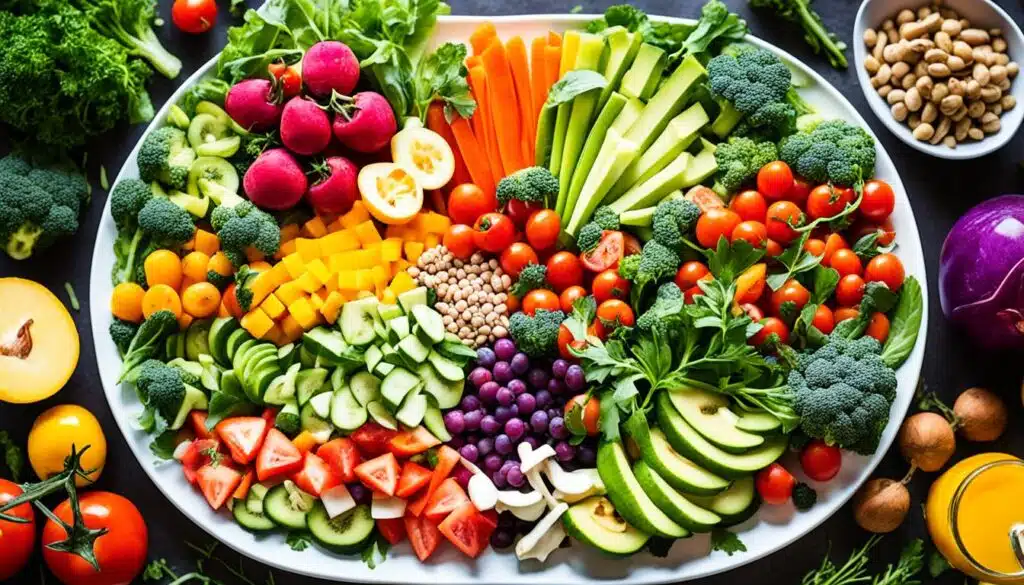
A well-thought-out vegan diet gives your body all it needs nutrionally. People who are vegan usually eat more fiber, antioxidants, and helpful plant substances. They get lots of vitamins and minerals such as vitamins C and E, folate, and magnesium. Since it’s naturally low in bad fats and cholesterol, a vegan diet brings a lot of health perks.
Cholesterol Control and Heart Health
Going vegan means you cut out foods that are heavy on cholesterol and bad fats. This can keep your cholesterol in check and lower your chance of heart disease. Research shows vegans have less heart issues than those on a meat-eating diet.
Increased Energy and Vitality
A carefully crafted vegan diet, filled with whole plant foods, boosts your energy and makes you feel alive. With lots of complex carbs, fiber, and vital nutrients, it keeps your body and mind healthy. This leaves you full of energy and life.
Weight Management Benefits
Choosing a vegan diet can help with keeping a good weight. Such diets have less calories and more fiber. This combo makes you feel full, aiding with maintaining a healthy weight. Studies suggest people lose more weight on a vegan diet than on other diets.
Essential Nutrients in a Vegan Diet
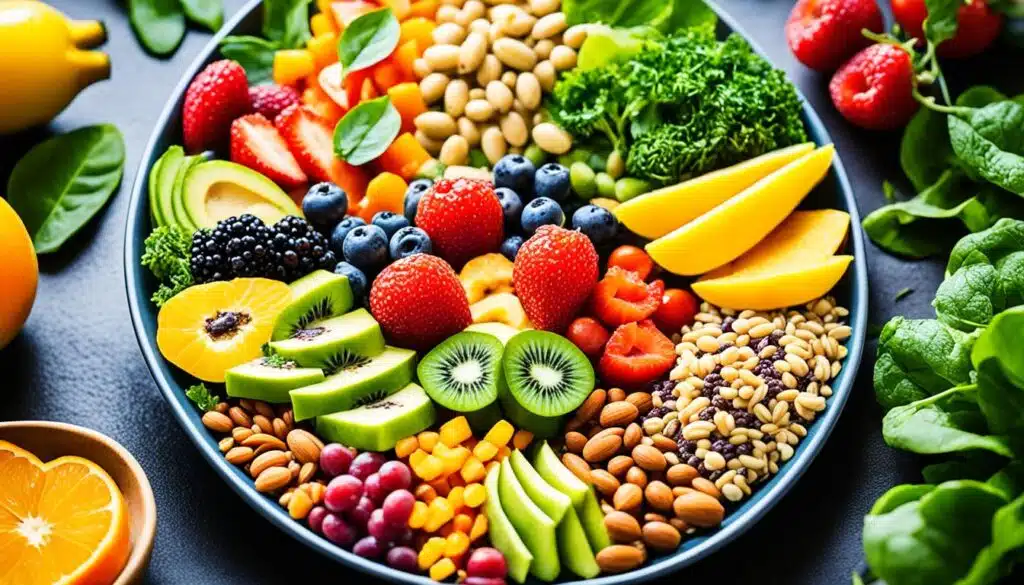
A well-thought-out vegan diet gives your body all necessary nutrients. Yet, you should be cautious of certain vitamins and minerals. It might need a little extra focus. Learning the best sources for these nutrients makes your vegan diet balanced and nourishing balanced diet.
Plant-Based Protein Sources
It’s easy for vegan diets to meet your protein needs. You can get protein from legumes including beans, lentils, and peas. Soy products like tofu, tempeh, and edamame are also great. Whole grains, as well as nuts and seeds, add to your protein on a vegan diet vegetarian and vegan diet.
Vegan Sources of Calcium and Iron
Leafy greens, fortified plant-based milks, tofu, tempeh, and legumes are rich in calcium and iron. Some vegan people take calcium and iron supplements. This helps ensure they get enough every day, especially on strict vegan diets.
Obtaining Essential Fatty Acids
Vegan diets might lack omega-3 fatty acids, but there are plant-based options. Flaxseeds, chia seeds, walnuts, and algae supplements are good sources. They help meet your body’s need for essential fatty acids on a vegan diet.
| Nutrient | Vegan Sources |
|---|---|
| Protein | Legumes, soy-based foods, whole grains, nuts, and seeds |
| Calcium | Leafy greens, fortified plant-based milk alternatives, tofu, tempeh |
| Iron | Leafy greens, legumes, fortified cereals, and dried fruit |
| Omega-3 Fatty Acids | Flaxseeds, chia seeds, walnuts, and algae supplements |
Being aware of key nutrients and adding diverse plant-based foods helps your vegan diet meet your body’s needs vegan and vegetarian. This ensures your body gets all the essential nutrients to stay healthy balanced vegan.
Planning a Well-Balanced Vegan Diet
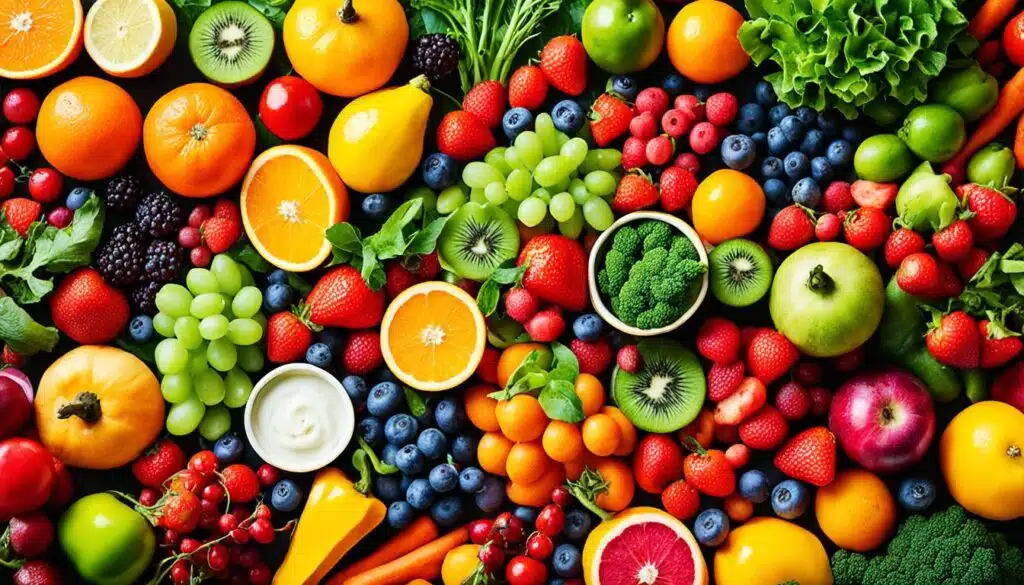
Being a vegan means finding a balance. It’s about enjoying a mix of plant-based foods. This way of eating supports your health. It also helps the planet and treats animals right. There are many plant-based alternatives for all your favorite meals diet excludes all animal products.
Incorporating a Variety of Plant Foods
A good vegan diet has lots of whole plant foods. Think fruits, vegetables, whole grains, legumes, nuts, and seeds. These foods are full of good stuff like vitamins, minerals, and antioxidants vegan diet has been shown. They keep you healthy. Include foods like tofu, tempeh, seitan, and plant-based meat alternatives for protein.
Meal Planning and Preparation Tips
To plan good vegan meals, be open to new things. Try new recipes with plant-based foods. There’s a lot to choose from, like dairy-free milk. Meat-free burgers and sausages are tasty options, too. It’s smart to prep meals ahead of time. This way, you always have something good to eat.
With the right approach, a well-balanced vegan diet is easy to achieve. It’s not just good for your health. It’s also the right choice for the planet and the animals we share it with diet can reduce the risk.
Also Read : Discover The Trans-Formative Power Of Fitness For Enhancing Your Lifestyle
Vegan Diet for Specific Needs
While a well-planned vegan diet is good for many, some need extra care. Athletes and moms-to-be should consider how they eat more carefully switch to a plant-based diet.
Vegan Diets for Athletes
Vegan athletes can do really well on plants, but they need to plan their meals. They should focus on getting enough protein, carbs, and good fats. Studies show a well-planned vegan diet can help with being strong, getting better after exercise, and staying healthy overall.
Protein sources for vegans include tofu, tempeh, legumes, nuts, and seeds. These are great for helping active people meet their protein needs.
Plant-Based Eating During Pregnancy
Vegan diets can work for pregnant women too, but they must be well-rounded. It’s important to focus on getting enough nutrients like folate, iron, calcium, and vitamin B12. With the right plan and maybe some supplements, a vegan diet can support a healthy pregnancy and a baby’s growth.
A well-thought-out vegan diet can meet the special needs of different groups. Taking care in how you plan it is key, whether for athletes or those expecting a child vegan diets are more effective.
FAQs
Q: What is the difference between a vegetarian and a vegan diet?
A: A vegetarian diet excludes meat, poultry, and seafood, while a vegan diet also excludes all animal products, including dairy, eggs, and honey.
Q: How can someone adopt a vegan diet?
A: To adopt a vegan diet, one must eliminate all animal products from their meals and opt for plant-based alternatives for protein, vitamins, and minerals diets for weight loss.
Q: Are there different types of vegan diets?
A: Yes, there are various types of vegan diets such as raw vegan, whole-food vegan, high-carb low-fat vegan, and more aspects of the vegan diet.
Q: What are some vegan sources of essential vitamins and minerals?
A: Vegan sources of essential nutrients include fortified foods, plant-based sources of protein like legumes and nuts, and fruits and vegetables rich in vitamins and minerals.
Q: Can a vegan diet help improve health conditions like type 2 diabetes?
A: Yes, studies suggest that following a vegan diet can improve insulin sensitivity and help manage blood sugar levels in individuals with type 2 diabetes low-fat vegan diet.
Q: What are the benefits of adopting a vegan diet?
A: Some benefits of a vegan diet include reduced risk of chronic diseases, lower cholesterol levels, weight management, and increased intake of fiber and antioxidants people who follow a vegan.
Q: How does a vegan diet contribute to a sustainable and ethical lifestyle?
A: By avoiding animal-based foods, individuals following a vegan diet contribute to reducing environmental impact, promoting animal welfare, and supporting sustainable food practices switching to a vegan diet.
Source Links
- https://zenfoods.com/wellness/plant-powered-living-embracing-the-vegan-lifestyle/
- https://medium.com/@syifaaudiaramdani/embrace-plant-powered-living-with-vegan-diet-your-guide-to-a-healthier-compassionate-lifestyle-fe4f5aac95ee
- https://medium.com/@abhaynafde08/embracing-plant-powered-living-the-surge-of-veganism-and-its-health-benefits-vegan-healthyfood-c1da40763740
